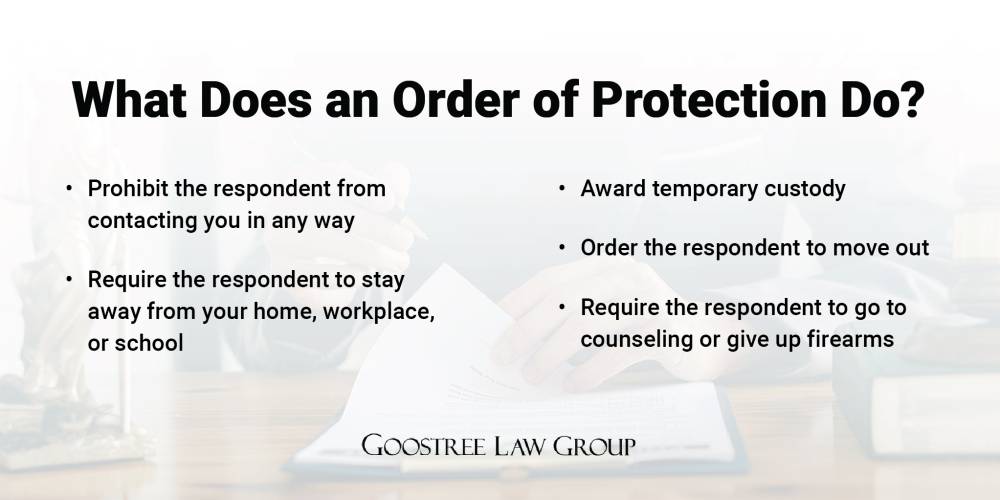Orders of Protection in Illinois
 Filing for an Order of Protection can be a critical step towards a better life for someone experiencing abuse, harassment, or serious threats. In Illinois, these legal orders offer protection from physical harm, stalking, intimidation, and interference with personal freedom. But they are not one-size-fits-all, and although they do provide protection in most circumstances, they also come with legal, emotional, and safety considerations.
Filing for an Order of Protection can be a critical step towards a better life for someone experiencing abuse, harassment, or serious threats. In Illinois, these legal orders offer protection from physical harm, stalking, intimidation, and interference with personal freedom. But they are not one-size-fits-all, and although they do provide protection in most circumstances, they also come with legal, emotional, and safety considerations.
Whether you need to protect yourself and your children, or are defending against a wrongful accusation in a heated custody or divorce case, it is important to understand how Orders of Protection work under current Illinois law. A St. Charles, IL order of protection attorney at Goostree Law Group can help you take the next steps with clarity and caution.
What Is an Illinois Order of Protection Exactly?
An Order of Protection is a court-issued order that restricts the behavior of someone who has allegedly committed abuse or posed a threat. The person asking for the order is called the petitioner. The person the order is filed against is the respondent. In Illinois, Orders of Protection are governed by the Illinois Domestic Violence Act (750 ILCS 60).
To request an order, the petitioner must file a sworn petition explaining why protection is needed. This includes describing specific incidents of abuse, threats, stalking, or other harmful behavior. Abuse includes not just physical violence, but also harassment, interference with personal liberty, and intimidation.
Who Can File for an Order of Protection?
You can seek an Order of Protection if you have a specific type of relationship with the respondent, such as:
-
A current or former spouse
-
A current or former dating partner
-
A parent, child, or stepchild
-
A roommate or household member
-
A co-parent (regardless of marital status)
If the person threatening you does not fall into one of these categories, you may still be eligible for other protective orders, such as a Civil No Contact Order or a Stalking No Contact Order. An attorney can help you determine which one is best for your situation.
Types of Orders of Protection in Illinois
Illinois offers three types of Orders of Protection, each with different purposes and timelines.
Emergency Order of Protection (EOP):
An Emergency Order can be issued the same day a petition is filed. The judge can grant the order without notifying the respondent (called an ex parte hearing) if there is an immediate danger. These orders typically last 14 to 21 days, until a full hearing can be held.
Interim Order of Protection:
If the respondent has been notified but the full hearing has not yet occurred, the court may issue an Interim Order. This temporary order can provide protection for up to 30 days while the case proceeds.
Plenary Order of Protection:
This is the most comprehensive order and can only be issued after both parties have had a chance to appear in court. A Plenary Order can last up to two years and may be renewed. It can include restrictions on contact, living arrangements, visitation with children, and more.
What Does an Order of Protection Do?
Depending on the facts of your case, the court can include a wide range of remedies in an Order of Protection. These may include:
-
Prohibiting the respondent from contacting you in person, by phone, or online
-
Requiring the respondent to stay away from your home, workplace, or school
-
Awarding temporary custody or parenting time restrictions
-
Ordering the respondent to move out of a shared residence
-
Requiring the respondent to attend counseling or refrain from possessing firearms
If children are involved, the court can address parenting time and temporary custody arrangements in a way that prioritizes safety.

When is an Order of Protection Not a Safe Option?
Although Orders of Protection exist to protect victims of abuse, they are not without potential danger. If you are dealing with an especially violent or controlling partner, filing for an Order of Protection may make their behavior worse, especially once they are served with the court documents.
For this reason, it is essential to think through an entire safety plan, not just the legal filing. If you are afraid your partner may retaliate, you should speak with a domestic violence counselor, an attorney, or a trusted advocate to get ready before you file an Order of Protection. This might include arranging other housing, changing phone numbers, telling your child’s school, or getting police involved ahead of time.
Responding to a False or Misleading Petition for an Order of Protection
Sometimes, a person may be named as a respondent in an Order of Protection petition based on false claims or distorted facts. This often happens during a contested divorce or custody case. Being subject to an Emergency Order can affect your parental rights, housing, gun ownership, and reputation.
If you are facing allegations of abuse and believe they are not true, you still have rights. You are entitled to a hearing and to present evidence. The court must evaluate both sides before issuing a Plenary Order. It is important to take these accusations seriously and work with a lawyer who can prepare a strong defense on your behalf. Ignoring a petition could mean the petitioner gets everything they ask for.
What Happens After an Order Is Filed?
Once the initial petition is filed, the court will review it the same day. If an Emergency Order is granted, the respondent will be served, typically by the police, and a hearing will be scheduled within two to three weeks.
At the full hearing, both parties can testify, present evidence, and bring witnesses. The judge will then decide whether to issue a Plenary Order and what terms it will include. Violating any Order of Protection is a criminal offense in Illinois and may lead to arrest and jail time.
Orders of Protection and Divorce or Custody Cases
If you are going through a divorce or child custody dispute in Kane County, an Order of Protection may directly affect your parenting case. For example, if the court believes your child is at risk, it may restrict the other parent's visitation or require supervised parenting time.
However, the court also reviews these cases carefully to determine whether the request is truly for protection, not just a strategic move in the family law case. Allegations must be backed by credible evidence.
Our attorneys can represent you in both family law and protection matters, ensuring your parenting rights are protected while prioritizing your child’s safety.
Contact a St. Charles, IL Order of Protection Lawyer
Whether you are seeking protection from abuse or responding to a petition filed against you, the process can be exhausting and complicated. At Goostree Law Group, we help clients on both ends of an order of protection navigate the family court system and pursue outcomes that prioritize truth, safety, and justice.
If you are considering an Order of Protection, or have been served with one, do not wait. Call our Kane County, IL order of protection attorneys at 630-584-4800 to schedule a confidential consultation and get the support you need.












